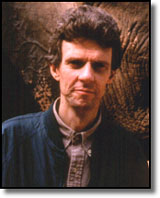
|
| David Loyn |
David Loyn Remembers Diana
"On the first day of a three-day trip, the only things we were told in advance were that she would arrive, and five hours later she would walk into a building in Tuzla. It was not much to go on, particularly bearing in mind the huge complexity of sending TV pictures from Bosnia, where television stations a few miles apart will not transmit to each other, because one side is Muslim and the other side Serb."There were some meetings in Bosnia with mine victims which she did invite the press to witness. But the most touching TV pictures were filmed at one meeting which she had not wanted us at.
"I still do not know why that house was supposed to be a secret. The two sisters who had each lost a foot stumbling through the same minefield were happy to see the TV camera. But as the lens followed Diana when she walked from the house into some trees, there was just enough material to make a telling picture, before her Scotland Yard guard stood in front of the camera.
"The most powerful picture in the whole weekend - Diana comforting a bereaved widow in Sarajevo's largest cemetery - does not exist on television. She did not invite us there but took along only one newspaper photographer.
"The landmines issue was a brilliant one to choose. In his tribute Nelson Mandela actually said that her intervention had helped to outlaw landmines in South Africa, Angola and Mozambique.
"Anti-personnel mines are vicious weapons which last for years after the end of hostilities. A farmer was badly injured by one only a few yards away from me in Afghanistan once, and the full import of the advice, never to stray off the track came home to me.
"But they play little part in the military planning of the modern western world. So although the former Conservative government was lukewarm, Diana could campaign on an issue which mattered without raising too much political dust at home.
"But she had to do it in her own way. Her original hosts in Bosnia were to be the Red Cross. Her falling out with them was over more than the diplomatic problem that the leader of the Serbian branch of the Red Cross is the wife of the country's most wanted war criminal, Radovan Karadzic. One night in Bosnia she hissed to someone that she felt let down by the Red Cross, that they had crossed her. Her visit was arranged instead at very short notice by two small anti-landmine agencies.
"And it was not without risk. I had been in Bosnia for weeks by then. The Foreign Secretary had come, raising speculation of more arrests of war criminals, and I had witnessed a village being ethnically cleansed for the second time, watched as the weary villagers packed up only days after starting to rebuild their old homes. They were forced out past a wall with the slogan in English "kill again".
"A few days later I was back in Zenica, the town where they had taken refuge. but this time I was with the Princess of Wales, watching a volleyball game played by men maimed by landmines. And it was hard to fault her effect. In Sarajevo itself they did not care greatly about her visit. They are jaded by the world.
"But elsewhere in Bosnia her charisma changed things. A group of Croat mine victims refused to meet a group of Muslim mine victims until they were told that she would be there. And she trudged through the dust up a hill to a poor house - the third world here in Europe. A young Jesuit priest there said her genuine concern for the poor made her shine."


